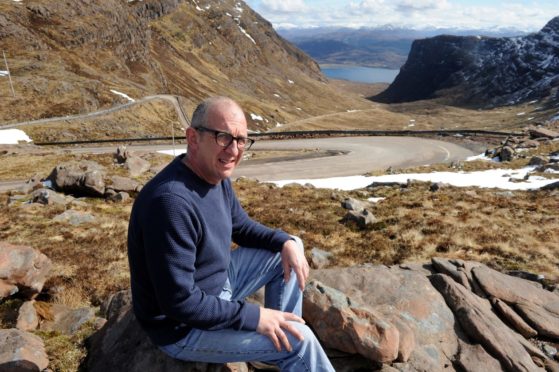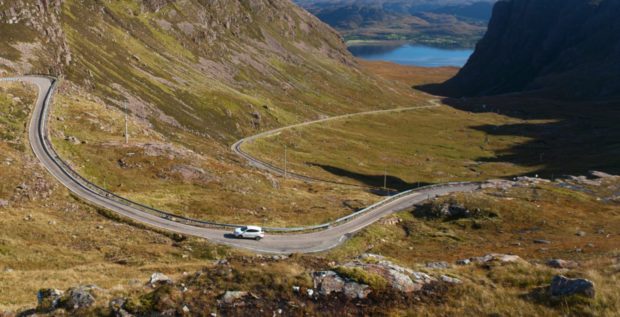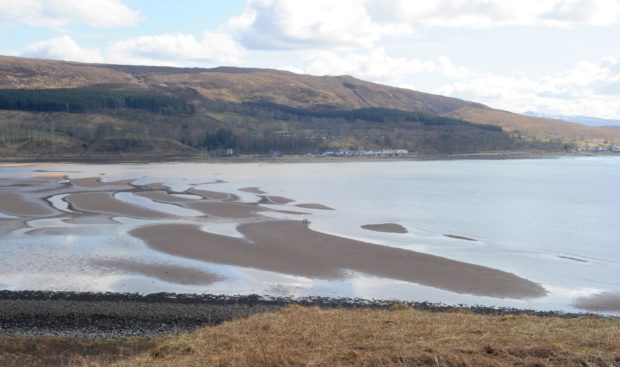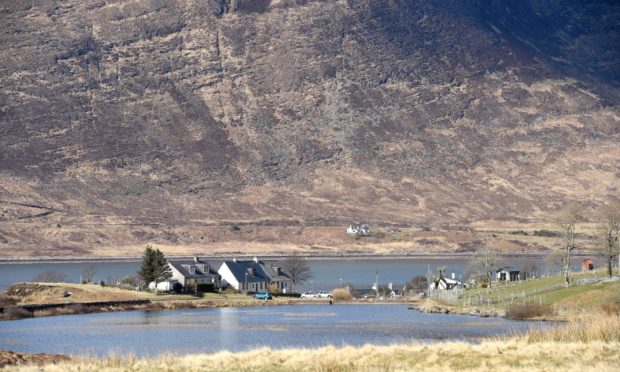It has one of the highest roads in Scotland and the views on the way are stunning.
So it is no surprise that Applecross is a popular stop for tourists completing the North Coast 500.
But now residents of the village will be asked if they want to remain part of the trail amid concerns about its impact on local infrastructure.
Earlier this year, moat-like ditches were dug at the Wester Ross village to stop motorhomes parking in environmentally sensitive places and signs put up warning of dirty camping.
While many businesses in the village are supportive of the NC500 and the trade it brings in, others feel the impact on the roads – and in particular on the winding Bealach na Bà – is starting to take its toll.
Poll for ‘divisive’ idea of NC500 ‘withdrawal’
The Bealach boasts the steepest ascent of any road climb in the UK and is the third highest road in Scotland.
Rising to 2,053ft with gradients of one in five and hairpin bends, it can be a challenge for any driver – but particularly motorhomes, who regularly get into difficulty.
Applecross Community Council has said that as part of working on a future strategy for managing the negative effects of tourism, the issue of “withdrawing” from the NC500 has been mooted.
Chairman John Glover, who also owns his own business, said: “There seems to be a bit of a consensus emerging for a local poll on whether we should seek to be removed from the NC500 route. It would basically ask people if they want to still be part of the official route.
“I have personally been particularly wary of popular referendums ever since June 2016, and it would be good to get more facts, figures and arguments from both sides, but the community council/tourism management group could maybe be persuaded to conduct such a poll in a strictly ‘advisory’ capacity.
“The NC500 is very divisive as, of course, being on the route brings many tourists to the area. However the other side of the picture is that there are concerns that the infrastructure, including the numbers of people who use the Bealach na Bà and who daily block the road due to accidents.
“Businesses quite rightly argue that they depend on the business the NC500 brings. But when you are waiting for medical attention or even deliveries to the area the traffic can be at the very least frustrating.”
Poll idea welcomed
The idea of a poll has already been welcomed on the group’s Facebook page.
Jess Whistance, marketing manager at The Applecross Trust, wrote: “I think a poll could be something we could do. Will have a look into the best way to action this.”
Bed and breakfast owner Kalie Wilkinson revealed some of her regular guests had actually been put off visiting due to the area’s sudden surge in popularity.
She wrote: “I agree that a poll is a sensible suggestion. Personally I’d be in favour of the peninsula coming off the NC500 marketing. Most businesses, including my B&B, were ‘comfortably’ busy before the arrival of the NC500 and have now become swamped. Some of my regular guests who came to stay for more than a couple of days have since decided that Applecross is no longer for them, which is sad.”
Gregor Watson added: “Certainly think there is merit in a tactical and tactfully diplomatic strategic withdrawal from the ‘NC500 race circuit’ with the community businesses and residents in broad agreement. Applecross is big enough and indeed small enough to stand on its own and it is certainly ‘amazing’ and unique.”
And Lynn Turner was also confident Applecross would remain popular if it was taken off the NC500 marketing.
She posted: “There’s no doubt that inclusion on the NC500 has increased footfall, or more accurately tyre fall, on the peninsula, and that businesses have benefited to an extent, however, it’s clear that our basic infrastructure is not currently capable of sustaining this level of tourism.
“Applecross, I believe, would remain a popular destination in its own right with or without inclusion on the main NC500 route.”
Community already working to manage impact of tourism
The village is keen to develop a long-term strategy targeting visitors interested in green tourism and a more relaxed holiday.
It has already been working with the Applecross Trust on ways to balance tourism income, including from the NC500 route, against the impact of traffic, littering and pollution.
A statement on Applecross Community Council page said: “Whilst tourism is undoubtedly a large generator of wealth and employment in the community, it also brings significant impacts in areas such as waste management, traffic volumes, littering and pollution. The NC500 has perhaps exacerbated some of these problems.
“Given the extremely limited resources of bodies such as law enforcement agencies and Highland Council, many communities like ours are struggling to find coping strategies, and as we all care passionately about our communities and environment, feelings can run high. The brief summer season of 2020, after the surreal peace of lockdown, was a brutal reminder how difficult these problems can be to solve.
“The Tourism Management Group have now produced a document outlining a potential strategy for managing tourism in the future. Anyone who wishes to read it can do so via the home page of the forum website here and can comment through this Facebook threat or by directly contacting the community council through applecross.council.jon@gmail.com”
Communities ready for summer of staycations
With more people preparing for a staycation this summer, communities along the NC500 route are bracing themselves for an influx of visitors.
The tourism trail is worth more than £22million a year to the local economy.
Last year, Prime Minister Boris Johnson and his now wife Carrie Symonds enjoyed a brief holiday in Applecross, sharing photos from a walk with baby Wilfred.
However, they landed themselves in hot water after pitching a tent and lighting a fire in a farmer’s field without permission.
The farmer accepted that no damage had been caused and received an apology from Mr Johnson’s staff.



